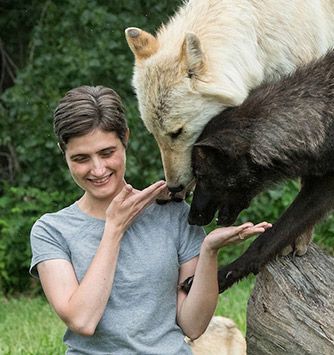
Publisher:
Bonnie King
CONTACT:
Newsroom@Salem-news.com
Advertising:
Adsales@Salem-news.com

~Truth~
~Justice~
~Peace~
TJP
Apr-03-2014 13:44

 TweetFollow @OregonNews
TweetFollow @OregonNews
Gettysburg College visiting Professor Leads Dog Barking Research
Salem-News.comFor the study, Gettysburgians first recorded barks from small, medium, and large dogs. The collected barks will now be played back to local dogs participating in the research to see how the pooches react to the barks.
 Gettysburg College Visiting Assistant Professor of Biology Kathryn Lord. Photo: gettysburg.edu |
(GETTYSBURG, Pa.) - Dogs--they're loyal, loving, and always there to lend an ear when you need it most. But when it comes to understanding their vocalizations--let's just say it can get lost in translation.
Man's best friend seemingly barks at everything--from the television, to the neighbors, to ladybugs on the windowsill--so what does it mean? Gettysburg College Visiting Assistant Professor of Biology Kathryn Lord and her students are working to unveil the truth behind the barks of domesticated dogs and help owners better understand the outbursts of their favorite canines.
Your pooch may produce varying forms of "yelps," "woofs," and "cries," but to a trained ear like Lord's, a bark is a distinct vocalization.
"It is a signal that is always abrupt in onset and short in duration," said Lord, a researcher of evolutionary and developmental behavior, specifically in dogs and wolves.
Barking is common among both birds and mammals, including deer, seals, and monkeys, but is the hallmark of domesticated dogs since they bark more frequently than any other animal, even wolves, their closest cousin.
Why? Lord theorizes barking is due to an evolved behavior known as mobbing, a response typically provoked by the approach of a threat.
To understand the behavior, you need to look back 10,000 years to when our furry friends first started roaming human food dumps. Although it was a great way for dogs to score a free meal, it also forced them to compete against other predators.
At this time, if dogs wanted to secure their dinner, they needed to permit potential threats, including humans, to get a lot closer to them without fleeing. The interaction, even today, causes conflict within the dog--it doesn't know whether to stand its ground or run away from the intruder, so it barks.
"Conflict can also occur when dogs are constrained by their environments and cannot engage in a normal way," Lord said
For example, when your relatives visit for the holidays, your dog may label the unfamiliar faces as a threat, but cannot escape due to the confines of the house, so it resorts to mobbing.
According to Lord, scenarios like the one above subject domesticated dogs to more internal conflict on a daily basis, and therefore, increase their tendency to bark.
Lord encourages owners to pay close attention to their dog's bark, as it may provide clues as to whether their pet is feeling threatened in a given situation.
"If you hear a high pitched bark from your dog, it is inviting you to come here," she said, "but if it's a low pitch bark, it's telling you to go away."
Since the fall, Lord has been working with Gettysburg students to determine if dogs can actually discern these variations in pitch and identify a noisy bark versus a tonal bark of play.
"Hopefully, we will be able to say with our results that dogs do understand barking and that it is a form of communication for them," said Coby Rudakewiz '15, a biology major, chemistry minor, and Pre-Veterinary Club vice president.
"Plus, it's a great way for our students to have some cuddle time with the dogs," Lord joked.
For the study, Gettysburgians first recorded barks from small, medium, and large dogs. The collected barks will now be played back to local dogs participating in the research to see how the pooches react to the barks. This second phase of research will be conducted on campus until early April.
"I've learned a lot about the process professors have to go through in regards to conducting experiments," said biology major Malcom Belin '15. "I would tell other students to take the Animal Behavior course if they are interested in animals because you learn a lot."
"I have learned more about not only the different variations and sound markers in dogs' barks, but also how to use research equipment and sound analysis programs that I haven't been exposed to," Rudakewiz added. "This is my first research experience at Gettysburg College, so Dr. Lord has been very helpful in taking us through it step by step. I can honestly say it has truly been a pleasure." Interested in bringing your dog to campus for the study? Contact Prof. Kathryn Lord at klord@gettysburg.edu.
Founded in 1832, Gettysburg College is a highly selective four-year residential college of liberal arts and sciences with a strong academic tradition that includes Rhodes Scholars, a Nobel laureate and other distinguished scholars among its alumni. The college enrolls 2,600 undergraduate students and is located on a 200-acre campus adjacent to the Gettysburg National Military Park in Pennsylvania.
 |
 |
 |
Articles for April 2, 2014 | Articles for April 3, 2014 | Articles for April 4, 2014



Quick Links
DINING
Willamette UniversityGoudy Commons Cafe
Dine on the Queen
Willamette Queen Sternwheeler
MUST SEE SALEM
Oregon Capitol ToursCapitol History Gateway
Willamette River Ride
Willamette Queen Sternwheeler
Historic Home Tours:
Deepwood Museum
The Bush House
Gaiety Hollow Garden
AUCTIONS - APPRAISALS
Auction Masters & AppraisalsCONSTRUCTION SERVICES
Roofing and ContractingSheridan, Ore.
ONLINE SHOPPING
Special Occasion DressesAdvertise with Salem-News
Contact:AdSales@Salem-News.com

Terms of Service | Privacy Policy
All comments and messages are approved by people and self promotional links or unacceptable comments are denied.
[Return to Top]
©2025 Salem-News.com. All opinions expressed in this article are those of the author and do not necessarily reflect those of Salem-News.com.